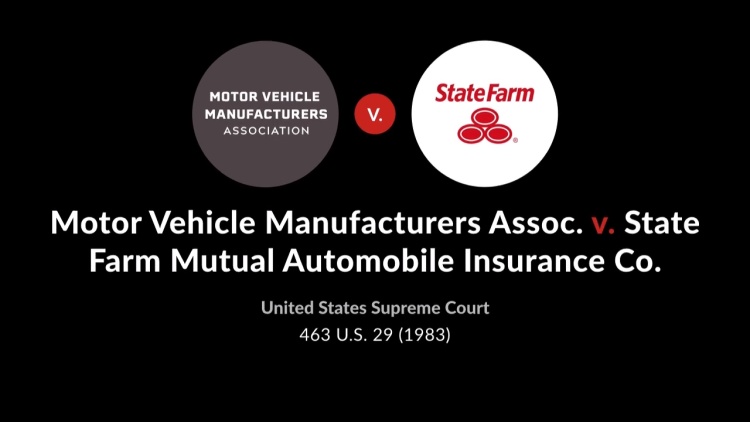Motor Vehicle Manufacturers’ Association v. State Farm Mutual Automobile Insurance Co.
United States Supreme Court
463 U.S. 29 (1983)
- Written by Susie Cowen, JD
Facts
The National Highway Traffic Safety Administration (NHTSA) issued Modified Standard 208, which mandated the phasing in one of two types of passive restraints in automobiles: airbags and passive seat belts. Prior to the deadline for complying with the standard, and after the election of a new president of a different political party, the secretary of transportation reopened the rulemaking. Two months after reopening the rulemaking, the NHTSA ordered a one-year delay in the first application of the standard and proposed the possible rescission of the entire standard. After receiving written comments and holding public hearings, the NHTSA issued a final rule rescinding Modified Standard 208’s passive-restraint requirement. In rescinding this requirement, the NHTSA stated that it could no longer find—as it had prior to the initial proposal of the rule—that such a requirement would produce significant safety benefits. This judgment did not reflect a change of opinion regarding the effectiveness of the technology, but a change in plans by the automobile industry. Specifically, at the time of the rescission, it was apparent that manufacturers planned to install automatic seat belts in approximately 99 percent of new cars.
Rule of Law
Issue
Holding and Reasoning (White, J.)
Concurrence/Dissent (Rehnquist, J.)
What to do next…
Here's why 907,000 law students have relied on our case briefs:
- Written by law professors and practitioners, not other law students. 47,100 briefs, keyed to 996 casebooks. Top-notch customer support.
- The right amount of information, includes the facts, issues, rule of law, holding and reasoning, and any concurrences and dissents.
- Access in your classes, works on your mobile and tablet. Massive library of related video lessons and high quality multiple-choice questions.
- Easy to use, uniform format for every case brief. Written in plain English, not in legalese. Our briefs summarize and simplify; they don’t just repeat the court’s language.





